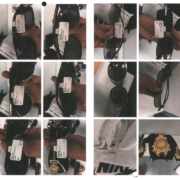Solana Beach Woman Sentenced for Killing Stepfather
San Diego County District Attorney Summer Stephan announced today that defendant Jade Janks, 39, who was convicted by a jury on December 21 of first-degree murder, has been sentenced to 25 years-to-life in prison.
Hours after she picked up the victim from a medical care facility, Janks drugged and strangled Tom Merriman, 64, to death on New Year’s Eve 2020 because she found nude photos of herself on his computer. Merriman was the co-founder of the education and research nonprofit Butterfly Farms, which had a half-acre vivarium in Encinitas.
“This was a complex case that our prosecution team along with law enforcement worked tirelessly on to prove the premeditated nature of this killing,” DA Stephan said. “Although today’s sentence will not bring back Mr. Merriman, it is a measure of justice for his family after a long ordeal.”
While Merriman was recovering on December 23, 2020 at a medical care facility in Encinitas, Janks went his home to tidy up when she accidentally bumped his computer mouse and discovered hundreds of nude photos of herself on his computer. She reached out to a friend who said he could help “fix” her problem. On December 31, Janks picked up her stepfather after he was discharged and gave him several pain pills and sleeping pills.
She texted her friend, the fixer, that she “just dosed the hell out of him” and was bringing Merriman home. But the fixer never showed up, causing Janks to panic and send a flurry of text messages, including:
- “He’s waking up. I really don’t want to be the one to do this.”
- “He is waking up and I really need help.”
- “I am about to club him on the head as he is waking up.”
- “It’s going to be Weekend at Bernie’s.”
Later that evening, a friend of Janks’ arrived, and Janks confessed that she drugged, suffocated, and strangled Merriman and needed help putting his body in his bed to make it look like an overdose. The friend said he couldn’t help, left and called police reporting what Janks said and letting them know they should look for Merriman.
The San Diego Sheriff’s Department contacted Janks and looked for Merriman but couldn’t find him anywhere in his home or her residence. As they were finishing their search of the premises, detectives looked under a pile of trash in Merriman’s driveway and found his body buried underneath it. The San Diego Sheriff’s Department conducted an extensive investigation—interviewing dozens of witnesses, examining terabytes of data, and testing numerous pieces of evidence for DNA—that ultimately solved the case and led to a first-degree murder conviction.
Deputy District Attorneys Jorge Del Portillo and Teresa Pham prosecuted this case.










